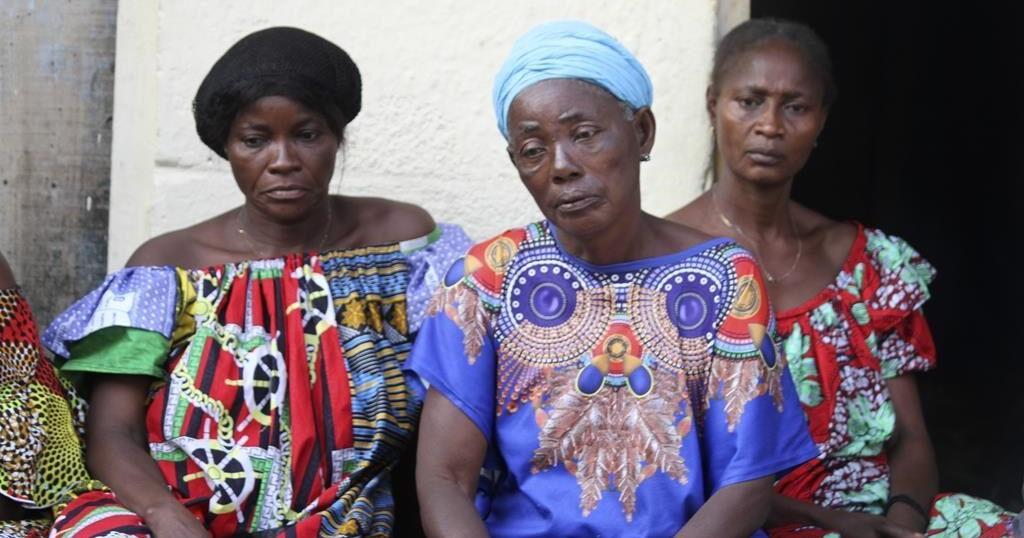KINSHASA, Congo (AP) — Families of those killed in what authorities called an attempted jailbreak in Congo’s biggest prison are demanding answers from the government as activists denounce what they say are inhumane conditions in the nation’s overcrowded penitentiaries.
Officials have said that 129 people died, including some who were shot by guards and soldiers, and others who died in a stampede trying to escape the Makala Central Prison in the capital of Kinshasa early on Monday. Justice Minister Constant Mutamba called the attempted jailbreak a “premeditated act of sabotage” and promised a “stern response.”
But rights groups and the opposition called for an independent investigation, accusing the government of using excessive force and covering up the true death toll. One prominent activist said more than 200 were killed.
Everixk Nzeu, a 25-year-old who died in the chaos, was arrested two months ago in the western part of Kinshasa, and transferred to Makal on a provisional arrest warrant, his mother Madeleine Mbalaka told The Associated Press — without trial or conviction.
“I visited my son on Sunday, he was fine,” Mbalaka said. “But around 6 a.m., his roommates called us to tell us he was dead.”
Her son left behind an 8-year-old daughter.
The family has not been able to see his body, she said, adding that they had gone to the morgue but were turned back.
“I ask the Congolese authorities to provide us with explanations because we do not know exactly what happened,” she pleaded. “I ask that justice be done.”
Congolese Interior Minister Jacquemin Shabani said on the social media platform X that a provisional assessment showed that 24 inmates were fatally shot by “warning” shots fired by guards as they tried to escape the facility.
“There are also 59 injured people taken into care by the government, as well as some cases of women raped,” he said, adding that order had been restored at the prison, part of which was burned in the attempted jailbreak.
It wasn’t immediately clear if all 129 fatalities were inmates and officials did not say how the stampede happened. Shabani also did not elaborate on the alleged rape cases at Makal, which has both female and male inmates.
The European Union on Wednesday called on Congolese authorities “to quickly shed light on these tragic events in order to establish the various responsibilities, including with regard to respect for human rights and the rule of law.”
Martin Fayulu, an opposition leader, compared the death toll to “summary executions” and said it was an “unacceptable crime that cannot go unpunished.”
However, Emmanuel Adu Cole, a prominent prison rights activist, told the AP that there were more than 200 dead, many of them shot, citing videos shared from the prison as well as according to inmates he spoke to. The AP was unable to independently verify the videos.
Gunfire inside the prison started around midnight on Sunday and lasted into Monday morning, local residents in the area said.
“Shots were ringing out everywhere,” said Stéphane Matondo, who lives nearby, adding that military vehicles arrived shortly after and the main road to the prison was blocked.
Monday’s tragedy underscored the overcrowding and dire living conditions in Congo’s prisons. Makala, Congo’s largest, with a capacity for 1,500 people, holds over 12,000 inmates, most of whom are awaiting trial, Amnesty International said in its latest country report.
The facility has recorded previous jailbreaks, including in 2017 when members of a religious sect stormed the prison and freed dozens of inmates.
Stanis Bujakera Tshiamala, a prominent Congolese journalist who was recently detained in the prison for months, spoke of its “deplorable and inhumane” conditions and how inmates constantly lack food, water, access to sanitary facilities and medical care.
“Makala prison, seen from the inside, looks more like a concentration camp than a penitentiary,” he told the AP. “The conditions of detention are absolutely deplorable and inhumane. The inmates are treated like sub-humans, deprived of their fundamental rights and subjected to inhuman living conditions.”
Congo’s deputy Justice Minister Samuel Mbemba Kabuya blamed the country’s judicial system for overcrowding in prisons, saying people are quickly jailed at the early stage of their trials. Mutamba, the justice minister, announced a ban on the transfer of inmates from Makala and pledged that authorities will build a new prison, among other efforts to reduce overcrowding.
But these pledges have little meaning for the victims’ families of the victims, who said they were being kept in the dark about the fate of their loved ones.
“It is sad that prisoners die as if they were animals,” said Joyce Imongo, whose 43-year-old brother was among those who died on Monday.

























